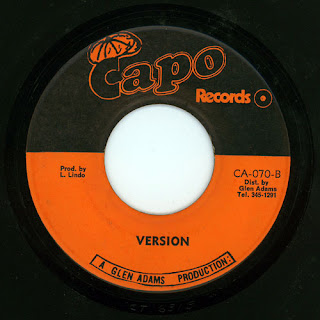We make no claim to have opened the book of Zora in a serious way. All we have is the necessary reverence for Their Eyes Were Watching God. We promise that we'll take up the the book, but we fear that when we look Zora's work full in the face, it will take full possession of our soul.
How do we know of this power? We were strumming through the Library of Congress's dusty files looking for artifacts of Langston Hughes. Instead we found ourselves in a file folder of depression era field recordings from Florida (and we commend the whole folder to you). Tucked inside, like someone meant to lose them, was a small treasure of Zora Neale Hurston recordings. For the last two days we have found ourselves dazzled outta listening to Langston's big crossover project Street Scene by this string os shiny objects.
What we're hearing: Zora's doubled up, on the one hand herself is digging the crates of her own memory and the street for material and on the other she's been a hand working in the field for the documentating anthropologist. She's both subject and object on both ends of the verb "to record." And then, to redouble, she makes a record of her voice. Now keep this trouble in mind. She does this long before some idle listener conjuring the past from the internets can anticipate that her voice will be one we want to carry the aura of the original. Of course we can chalk this up as the drudgery of the anthropologist who cannot anticipate the magic of the fieldworker. All they were doing was filling the ledger w/ obsessively kept records of the soon to be lost past work songs.
In keeping, this pocketful of songs carries all of the dutiful anthropologist detailing, including snipe hunting patterns and more true sources. There's card playing songs and track lining songs, references to the sawmills and geechees and the jukejoints, all of the places the unnaground places that A&R men go hunting for the next act to appear @ SXSW and coachella, right?
In "Mule on the Mount," you can listen to Zora in dialogue w/ the anthropologist riff up the whole theory of the tradition out of partial answers. This is how it really happened. How it came back and became the biggest song in America. In response to the sourceseeking questions she patiently develops a reply that tells much more of a story than the questions imagine they are asking for. "[The song] has enumerable verses and whatnot about everything under the sun.... There's nowhere you can't find parts of this song.... The tune is consistent. But the verses you know, in every locality you find new verses.... I'm gonna sing verse from whole lotsa places.... Yes, sometimes they sings thirty and forty verses.... It's one of these things that's grown by incremental repetition until it's one of the longest songs in America."
Zora, tho,' can take this quest for cool and turn it back on itself. As you work through the material and get to songs like "Uncle Bud," and "Mule on the Mount" and "Po' Gal" there is no helping yourself. The spell has been fully cast. These are beautiful songs because Zora knows them the way she knows them and sings them as beautiful as she can. And we are hypnotized by the beauty. But there's more. We are also hypnotized because now her historical grandeur outsizes the sum of the recordkepping and the beauty of the source and her beautiful take on it. The conjure power is as much because it is Zora's voice, carried back from the past, even as it carries back these tunes from a further past. This is the twice Lazarussian true record of the unnaground coming back, Orpheus coming back from the Orpheus story w/ the true music back from the dead.
We lined these records up into smaller clips. Take 'em to church. Shout 'em to the congregation. Call for the resurrection.
- "Georgia Skin," Zora Neale Hurston (1937). They lose money to the drop of a card.
- "Let the Deal Go Down," Zora Neale Hurston (1937).
- "Wake Up Jacob," Zora Neale Hurston (1937).
- "Description of Lining Track," Zora Neale Hurston (1937).
- "Shove it Over," Zora Neale Hurston (1937). The captain's got a pistol. He's tryn to play bad, but I'm gonna take it if he makes me mad.
- "Let's Shake It," Zora Neale Hurston (1937).
- "Gonna See My Long Haired Babe," Zora Neale Hurston (1937).
- "Dat Old Black Gal," Zora Neale Hurston (1937)
- "Mama Don't Want No Peas and Rice," Zora Neale Hurston (1937)
- "Halimuhfack," Zora Neale Hurston (1937). Hoodoo, hoodoo, hoodoo working.
- "Crow Dance," Zora Neale Hurston (1937).
- "Evalina," Zora Neale Hurston (1937). You know the baby don't favor me.
- "Tilly Lend Me Your Pigeon," Zora Neale Hurston (1937).
- "Oh, Mr. Brown," Zora Neale Hurston (1937). See all of the versions. Stuff for a future post.
- "Oh, the Buford Boat Done Gone," Zora Neale Hurston (1937).
- "Uncle Bud," Zora Neale Hurston (1937). It's one of those juke songs.
- "Mule on the Mount," Zora Neale Hurston (1937). There's nowhere you can't find parts of this song.
- "Po' Gal," Zora Neale Hurston (1937).
We'll see you when your troubles get like our'n.




